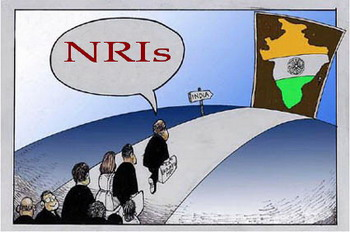How NRIs can contribute to India’s development?
Prime Minister Narendra Modi’s Government has decided to liberalize foreign direct investment norms for NRIs and overseas citizens of India (OCI) as it aims to increase capital flows into the country. The Indian Prime Minister also reached out to Non-Resident Indians (NRIs) with several incentives, including lifetime visas and he has done away with the NRI’s weekly attendance in police station which was mandatory. In short, the NRIs are welcomed with open arms by the BJP Government and some NRIs do feel the positive changes. Perhaps all this has to do with the Indian Government’s recently announced dual citizenship law and the effusive honor accorded to the NRIs at the Pravasi Bharatiya Divas. It seems the NRI is finally getting the recognition he deserves from the mother country.
The NRIs can do so much for India. For instance, some 200,000 prosperous NRI retirees in Canada and the U.S., who are considered a new brand of tourists, who wish to visit India routinely to escape the cold weather of the West. They will pour millions of dollars yearly into Indian economy, creating a ripple effect for the hospitality, healthcare, clothing and tourism sectors. In return, they want India to provide long-distance bus service at the major Indian airports, more frequent air links to more cities and build some safe 3-star and 4-star motel chains and more of bed and breakfast motels.
Yet again, a large number of foreign-educated NRIs about 25,000 of them such as doctors, engineers, teachers, economists, MBAs and the like, who are now superannuated from service and earning fabulous pensions, desire to serve India. These NRIs, the professional elites of the affluent First World, can certainly accept volunteer assignments in the nation’s schools, laboratories and institutions of higher learning. Till date we have not thought of tapping this resource. Perhaps the privately-run Indian colleges can set the ball rolling and break the mould to herald an era of innovative teaching and learning process. After all, in North American universities, summer courses are widely taught by the guest teachers. The Indian government institutions, caught as they are in inertia and red-tapism, will tend to resist. But once the barriers are removed India will create new intellectual trends to modernize learning and help accelerate its development.
Next, NRIs with the dual citizenship would be well inclined to invest in the real estate of India. India needs some 150 million new homes/apartments. NRIs have the money and experience of living in modern and safe apartments abroad. They would like to duplicate the experience in India!!
But there is one serious hurdle. While in the West, buying and selling property is a simple affair it is not so in India. For example, many an NRI, especially from Punjab, who had migrated to Canada decades ago, have in due course become the legal heirs to their ancestral properties in the State. But this ownership is more imaginary than real. The NRIs’ relatives, in collusion with the local officials, are often successful in nerve-racking and depriving them of their property. A similar situation exists in Kerala and Andhra Pradesh. Perhaps in the new government Ministry of NRI Affairs will help unravel the mess to attract foreign investment in a big way.
I think some 80 years ago, two NRIs, M.K. Gandhi and Jawaharlal Nehru, on returning home, could help throw off the mighty British Empire out, surely then the modern NRI can at least lend a helping hand to enhance prosperity in mother land. If given a chance, the NRI will become a symbol for change. We need to look at various avenues to engage their services.
NRIs bring with them broader perspectives, new ideas and different ways of doing things. The combination of local knowledge and cross-border processes often leads to valuable innovation. Indeed, many of the innovations for large social issues in India are the brainchild of returned NRIs. A citizen residing abroad, especially a first generation immigrant, almost inevitably feels the “pull” of home, and the prospect of return always remains a very real possibility. The sense of belonging is one of the challenges of a traveler’s life. Ambassadors, however, are always of the place they came from. Their fortunes remain intertwined with their origins, and the divide between the resident and the non-resident is simulated. When things go well for India—it reflects well on all of us. When things go wrong—we all stand together to criticize and defend what is ours. Good work done by each group supports the other both economically and socially. Creating artificial internal divisions diminishes us as a country, especially when we need to invest effort in finding synergies to build a strong country worthy of being called a great power.
Many NRIs help raise value of brand India. The individual NRIs out there who are in very significant positions are brand ambassadors of India. The dignity with which they present themselves, the quality of their contributions, the ability they hold in unfamiliar circumstances, all add to the respect of the home country. This is how NRIs uphold a positive brand image of India in foreign lands. They are the ones who suffer first if the national prestige of India suffers. Part of the daily negotiation for an NRI is to fit in with the rules and norms of the other place, and to be seen as trustworthy. This is great opportunity to counter some of the negative stereotypes persistent about India. We have to work hard to remove stigmas such as red-tapism, corruption, law and order issues and immoral activities right away.
NRIs can contribute to the development of India in transferring knowledge, funding to set up start-ups and provide more employment, setup or fund NGO’s to eradicate social issues, and they are the ones who can pressurize governments to take positive actions in research & development.
















































